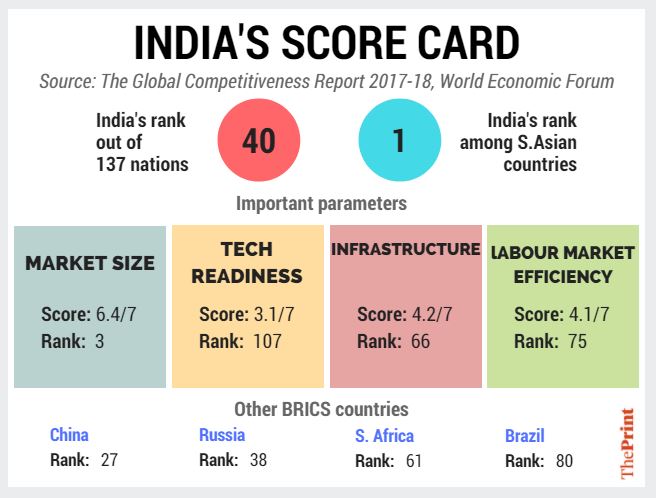India was ranked as the 40th most competitive economy - slipping one place from last year's ranking - on the World Economic Forum's (WEF) global competitiveness index, which is topped by Switzerland. On the list of 137 economies, Switzerland is followed by the US and Singapore in second and third places, respectively. Other countries in the top 10 are the Netherlands (4th), Germany (5th), Hong Kong SAR (6th), Sweden (7th), United Kingdom (8th), Japan (9th) and Finland (10th).
Among the BRICS countries, China (27) and Russia (38) are placed above India. South Africa and Brazil are placed at 61st and 80th spots, respectively. In South Asia, India has garnered the highest ranking, followed by Bhutan (82nd), Sri Lanka (85), Nepal (88), Bangladesh (99) and Pakistan (115).
The report said that India stabilized this year after its big leap forward of the previous two years, adding that the score has improved across most pillars of competitiveness. These include infrastructure (66th rank), higher education and training (75) and technological readiness (107), reflecting recent public investments in these areas.
According to the report, India's performance also improved in ICT (information and communications technologies) indicators, particularly Internet bandwidth per user, mobile phone and broadband subscriptions, and Internet access in schools. However, the WEF said the private sector still considers corruption to be the most problematic factor for doing business in India.
The report notes that a big concern for India is the disconnect between its innovative strength (29) and its technological readiness (up 3 to 107): as long as this gap remains large, India will not be able to fully leverage its technological strengths across the wider economy.
According to WEF's Executive Opinion Survey 2017, corruption is the most problematic factor for doing business in India. The second biggest bottleneck is 'access to financing', followed by 'tax rates', 'inadequate supply of infrastructure', 'poor work ethics in national labor force' and 'inadequately educated workforce', among others.
The Global Competitiveness Index (GCI) is prepared on the basis of country-level data covering 12 categories or pillars of competitiveness. Institutions, infrastructure, macroeconomic environment, health and primary education, higher education and training, goods market efficiency, labor market efficiency, financial market development, technological readiness, market size, business sophistication, and innovation are the 12 pillars.

No comments:
Post a Comment